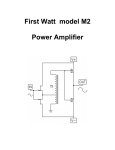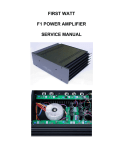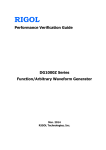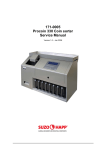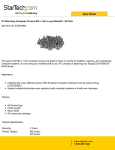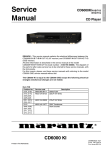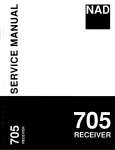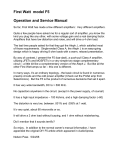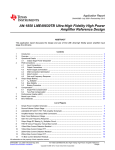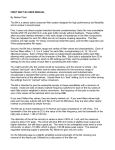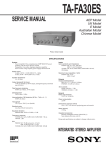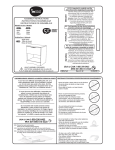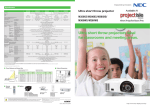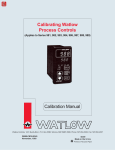Download F5 Turbo Assembly Instruction v3
Transcript
F5 Turbo PCB User Manual Version 3 Page 1 F5 Turbo V3 Assembly Instruction. 1. Introduction: This PCB is designed base on the Nelson Pass F5T V3 circuit. Details please refer to the article posted by Nelson on First Watt website: http://www.firstwatt.com/pdf/art_f5_turbo.pdf . .c o m The main difference between this version and Pass F5T V3 is that the PCB only use 3 pairs of power mosfet, not 4 pairs. The main reason is that this version PCB is 100% fit into the F4 PCB that I sold in 2007. Details: http://www.fetaudio.com/archives/33 . Thus this provide a fast upgrade from F4 into F5T without any modification of the heat sink. 2. Circuit Diagram: w w w .F ET Au d io Since the PCB is layout by FETAudio and here is the circuit diagram for reference. Notes: a. The Q7 and Q8 is in TO-92 package. I have also put TO-220 package pads in the PCB if the original transistors recommended by Nelson are used. b. J7 is a pin header and it should be shorted to ground by a jumper for normal operation. The “X” point is for those who want to modify the power amp into F5X mode. F5 Turbo PCB User Manual Version 3 Page 2 c. Since I use Toshiba 2SK1530 and 2SJ201 power Mosfets, I have changed some values of resistors and thus please refer to the update BOM (bill of material) for details. 3. Assembly Instruction: m a. Solder the ¼W resistors per BOM. Note that a gap about 1mm should be allowed between the body of resistor to the top of PCB. This is to prevent any arcing of high voltage from resistors to the ground plan. .c o b. Solder the 8 pcs film capacitors, 2 pcs LEDs, and 3 VRs. Note that the VRs P1 and P2 should have the same direction of the P3 as shown below. c. Solder the 3W resistors. f. Au d e. Lastly solder the E-capacitors. io d. Solder the Jfets K170 and J74 (Q1 and Q2). Then solder the transistors Q7 and Q8. Note that J15 and J16 (TH1) are Thermistor 4k7 (black color). The leads should be insulated by the shrink wrap provided. w w w .F ET g. J6, J8, J10, & J11 are M3 holes mounting for the PCB. Use a M3 x 16mm with 10mm post (stud) on the bottom side to mount the PCB onto the heat sink. F5 Turbo PCB User Manual Version 3 Page 3 h. Q3, Q4 and Q9 are marked IRF9240, solder 2SJ201 at these locations. i. Q5, Q6, and Q11 are marked IRF240, solder 2SK1530 at these locations. j. D1 – D5 and D7 are MUR3020W locations. k. When mounting the mosfet and MUR3020W, make sure an insulation thermal sheet is used to isolate the body from the heat sink. The drilling dimensions of the heat sink are provided at the end of this document. A heat sink size of 200mm x 400mm is used as an example. m l. .c o m. Insert the PCB mounting screws (total 4) from top and screw in a 10mm spacer post at the bottom of the PCB. Au d io n. When mounting the mosfet, fix them onto the heat sink as shown. Bends the leads about 90 deg upwards. Put the PCB on top and then insert all the leads (total 18) into the pad holes of the PCB. It will take a bit time to do so. Press down the PCB and then tighten the 4 PCB screws. Tighten the screws until they are in position. w w w .F ET o. Loosen the mosfet mounting screws a bit so that they will release some of the force on the leads. Tighten all the screws of the mosfets again. Version 3 Page 4 Au d io .c o m F5 Turbo PCB User Manual w .F ET p. Note that the MUR3020W should have their leads bended 90 deg also and then inserted into the PCB holes from bottom of the PCB. Do not forget the insulation sheet for them. It should be quite easy to do so as the leads of MUR3020 is just long enough to protrude out the hole by about 1.5mm. q. When all the PCB screws are in position and tighten, solder all the leads on top. Do not forget to solder the leads of MUR3020W. Note that the thermistor should be mounted as below. The leads must not touch any ground as it carries the +ve or –ve high voltages! Use the shrink tube provided to insulate the leads. w w r. F5 Turbo PCB User Manual Version 3 Page 5 s. Check the +Ve and –Ve point for any short circuit to the ground with a multi-meter. Note that a ground plan is used in the PCB design with a narrow gap. Thus extreme care must be taken care during soldering of any parts to prevent short circuit to the ground plane. Due to the narrow gap, the supply voltage of this PCB should not be more than +/-50V. 4. Tuning procedures: m a. Before power up, adjust P1 and P2 to fully anti-clockwise if P1 and P2 is same direction as P3 Pot. You will hear a “click” sound upon reaching the end of the tuning. This is a multi-turn pot and thus you will need to adjust many turns. w w w .F ET Au d io .c o b. Check the resistance between the points show must be below 1 ohm if P1 and P2 are adjusted correctly. c. Connect three DC meters at the locations shown. Version 3 Page 6 Au d io .c o m F5 Turbo PCB User Manual w .F ET d. Power up the amplifier, the output DC offset should be close to 0V. Voltage across R20 and R23 should also be 0V. If not, power off the amplifier immediately and trouble shoot. e. If there is no error, then adjust P1 slowly in clockwise direction until you see the output DC voltage start to increase. Stop at about +100mV. Then adjust P2 in clockwise direction slowly. The DC offset at output will then drop and then stop adjust P2 when at 0V (+/-1mV). Note the voltage drop in R20 and R23. They should be have some readings but no more zero. f. If you adjust the P2 more than required, the dc offset will go to negative voltage. In that case, turn the P2 anti-clockwise and the voltage will be back to around 0V. w w g. Target bias of 1A (for the three pairs of mosfet in total or per channel), then the voltage across R20 and R23 should be 0.167V. If target bias is 2A, then the voltage across the R20 and R23 should be 0.333V. Note that the voltage across R20 and R23 will not be the same but should be close within 10% if the mosfet are well matched. h. Then repeat the step “e” until the target bias current is reached. When the voltage across the R20 is more than 0.15V, the output dc offset should only be adjusted to up 50mV to ensure the bias is not increased too fast. When the bias is up to 0.2V across R20, adjust the dc offset to about 10 to 20mV to slow down the bias increment. In fact when you adjust, the heat sink is cold and thus the bias should only be 80% of the target value. The reason is that when the heat sink is hot, the bias will increase due to thermal drift. Let the F5 Turbo PCB User Manual Version 3 Page 7 heat sink temperature stable, re-adjust down or up until the target bias is reached. This will take about 1 hrs to stable temperature. Check through the voltage drop across all mosfet source resistors (1 ohm resistors) to see how good the match is. The voltage drop or bias should be within 10% across all the mosfets. This is to ensure that all the mosfet is matched within a reasonable limit and share an almost equal load on the total bias. j. Note that the DC offset will drift from cold to hot and it is normal. The target is that when hot, the dc offset should be within +/-10mV relative to ground. m i. io .c o • The R5 and R6 are changed to 475R from 1k ohm. This is to improve the tuning of bias to be less sensitivity. In that case, the output dc offset can be set to below 1mV easily. Moreover, the change will also improve the DC offset drift from cold to warm conditions to be within +/-10mV. l. Au d k. Thus adjust the bias value according to the heat sink size used. Target temperature of the heat sink should be below 50 degC. If you do not have 3 meters, then check the output DC offset and voltage across R20. I think two meters is a minimum. w w w .F ET m. For P3 pot adjustment, refer to Pass’s article for details. F5 Turbo PCB User Manual Version 3 Page 8 w .F ET Au d io .c o m 5. Picture of a complete set F5 Turbo: This set use Airlink 625VA 25Vx2 transformer, Bridge rectifier, 70000uF 50V Mallory, 1mH solen coil, 30000uF 100V Rifa long life. The ripple at the Rifa cap is below 5mV. Bias is set to 1.7A to 1.8A per channel and heat sink temperature is 52 deg C, room temp is 20 deg C. The idle noise level is around 100uV which is very low in the AP measurement. FFT and Distortion vs Power charts are attached in this document for reference. Distortion at 1W 8.2 ohm load is 0.004%. w w The use of an inductor 1mH air coil (AWG #14 solen) improves the ripple of the power supply by about 20 times. You can see the measurement in attachment page. For this set, the ripple is about 4.5mV peak to peak and the waveform is more rounded like a sine wave. In fact, not only the ripple is improved, the sound is even more relaxing and smooth! Thus this is highly recommended upgrade as the cost to add a 1mH inductor is cheaper than adding one more filter capacitor. Attachment follows:- FET Audio 12/12/12 20:47:42 +10 +0 om -10 -20 -30 ud io .c -40 -50 -60 -70 d B r -80 -90 TA A -100 -110 .F E -120 -130 -140 w -150 -170 -180 20 100 w 50 w -160 200 500 1k Hz Sweep Trace Color Line Style Thick Data Axis Comment 1 1 1 2 Red Magenta Solid Solid 1 1 Fft.Ch.1 Ampl Fft.Ch.2 Ampl Left Left Set 3 : 32V supply F5T FFT2.at27 2k 5k 10k 20k FET Audio 10 A-A 2 CHANNEL THD vs FREQ 12/12/12 20:58:00 T om 5 2 ud io .c 1 0.5 0.2 0.1 Grounded Input Floated Input 0.02 .F E 0.01 TA 0.05 0.005 0.001 100m 200m Sweep Trace 1 1 2 2 1 3 1 3 w w 0.002 500m w % 1 2 5 W Color Line Style Thick Data Axis Comment Red Magenta Green Red Solid Solid Solid Solid 1 1 1 1 Anlr.THD+N Ratio Anlr.THD+N Ratio Anlr.THD+N Ratio Anlr.THD+N Ratio Left Left Left Left Float input, lower noise Grounded input, higher noise F5T thd vs pwr.at27 10 20 50 100 6 5 4 3 2 1 REVISION RECORD ECO NO: 4k7 Q1 2SK170 0.22uf C7 10u 2k2 TH1 4k7 R13 35V S G R7 C3 Do not use R3 R9 200R R2 220R3W R10 10R 47k J5-2 R15 2SJ74 47R Q2 R28 D 4k7 R12 C8 220uf 0.22uf 1 J9 3 1 3 2 D K IRF9240 Q9 D C J2-1 P2 5k R16 47R S IRF240 Screw Screw J10 J11 R36 J13 Q11 IRF240 G 47R S S D4 -32V D7 R21 R22 R23 R24 R33 R34 1R3W 1R3W MUR3020W 1R3W 1R3W MUR3020W 1R3W 1R3W 2 MUR3020W D3 J14 D Q6 G C12 0.22uf C10 0.22uf + C2 1000uf C14 0.22uf B J3-2 35V J3-1 1 2 w Screw w A J8 10K COMPANY: w 1k J6 R26 J16-2 J16-1 475R C Screw J12 TH1 4k7 .F B R6 Screw G 2k2 35V R30 3 Q8 2SA970BL Q12 KSA1220AYS LED1 S D 1 E + IRF240 3 C6 B +32V CW G J17-2 35V MUR3020W J2-2 Q5 G J17-1 15k J1-2 OUTPUT D 220R3W S C1 1000uf C4 Do not use R4 J5-1 R40 3 3 J4-1 J7-2 CW 1K ET Au 2 J7-1 1R3W + D5 A 2 P3 INPUT J4-2 10R 1 R1 220R3W IRF9240 1R3W 47R Q4 1 C D R32 di IRF9240 220R3W R8 47R Q3 R31 R35 S D J1-1 MUR3020W G 47R S R14 3 G + 1R3W MUR3020W 0.22uf C13 Screw R27 D 1R3W D2 DATE: Screw C5 R20 APPROVED: Screw 1R3W R11 R19 0.22uf C9 2 1R3W D1 o. c R18 1 1 R17 2 E J15-2 J15-1 475R Q10 KSC2690AYS om 1 R29 B 2 C Q7 2SC2240BL 3 10K 2 R25 1k 0.22uf C11 CW R5 3 D P1 5k LTR TITLE: R41 15k K A LED2 DRAWN: DATED: CHECKED: DATED: QUALITY CONTROL: DATED: RELEASED: DATED: F4 POWER AMP A CODE: SCALE: SIZE: REV: DRAWING NO: SHEET: OF F5T BOM Cost page 1 of 1 Qty 1 0 1 0 1 1 2 2 8 0 1 6 3 3 2 6 2 2 2 2 1 12 2 4 2 2 6 1 2 8 1 2 1 PCB DECAL TO-92D TO-2-8H1AB TO-92D TO-2-8H1AB TO-92D TO-92D ECAP-A-5MM ECAP-A-5MM CK06 CK06 SIP-2P CONN-2P5MM TO-247_F4AB TO-247_F4AB LED TO-247_F4 SIP-2P RM10_1/4WR RM10_1/4WR RM10_1/4WR RM10_1/4WR RM12_5_3WR RM10_1/4WR RM12_5_3WR RM10_1/4WR RM10_1/4WR RM10_1/4WR RM10_1/4WR RM10_1/4WR SCREWM3 VRES-TOP-ADJ VRES-TOP-ADJ PCB-F5T .F ET Au di o. c om Reference Value Manufacturer Description Q8 2SA1145Y TOSHIBA PNP Low Noise PNP Transistor Q12 Do not use Fairchild PNP Driver Transistor Q7 2SC2705Y TOSHIBA NPN Low Noise NPN Transistor Q10 Do not use Fairchild NPN Driver TRANSISTOR Q2 2SJ74BL match TOSHIBA P-CHANNEL,LOW NOISE JFET Q1 2SK170BL match Toshiba N-CHANNEL, LOW NOISE JFET C1-2 560uf 35V 5mm Panasonic FC ALUMINUM ELECTROLYTIC CAP. C7-8 220uf 35V 5mm Panasonic FC ALUMINUM ELECTROLYTIC CAP. C5-6 C9-14 0.047uf 50V 5mm Panasonic ECQ-V RADIAL FILM CAPACITOR, MKS C3-4 Do not use CDE Mica 470pF 500V J7 2x1 pin Header with jumper China GENERIC 2 PIN SIP HEADER .100 CENTERS J1-5 J17 Do not use China GENERIC 2 PIN SIP HEADER .200 CENTERS (5MM) Q5-6 Q11 2SK1530 TOSHIBA MOSFET N CHANN POWER 200V 1.8A Q3-4 Q9 2SJ201 TOSHIBA MOSFET P CHAN 200V 1.8A LED1-2 LED TH Green LIGHT EMITTING DIODE D1-5 D7 MUR3020W Vishay Switch Mode Power Rectifier J15 J16 4.7k TH1 with shrink tube China Varistor negative temp 4k7 R25-26 10K Xicon RES BODY:060 CENTERS:400 R3-4 10R Xicon RES BODY:060 CENTERS:400 R40-41 15k Xicon RES BODY:060 CENTERS:400 R1 1K Xicon RES BODY:060 CENTERS:400 R17-24 R31-34 1R3W China 1% MF RES BODY:060 CENTERS:400 R5-6 1k to 475R Xicon RES BODY:060 CENTERS:400 R7-10 220R3W China 1% MF RES BODY:060 CENTERS:400 R11-12 2k2 to 1.21k Xicon RES BODY:060 CENTERS:400 R29-30 475R Xicon RES BODY:060 CENTERS:400 R13-16 R35-36 47R to 49.9R Xicon RES BODY:060 CENTERS:400 R2 47k Xicon RES BODY:060 CENTERS:400 R27-28 4k7 to 10k Xicon RES BODY:060 CENTERS:400 J6 J8-14 Do not use China M3 size P3 200R Bourns 3296W-1 VARIABLE RESISTOR (TOP ADJUST TYPE) P1-2 5k Bourns 3296W-1 VARIABLE RESISTOR (TOP ADJUST TYPE) PCB-F5T PCB-F5T China PCB-F5T Notes: 1. Use 1.2k for Toshiba power mosfet - low Vgs; improve thermal stability 2. 4k7 to 10k: 50% Vcc will be on input jfets, good for +/-22V supply 3. 47R to 49.9R; use 49.9R as alternative 4. R5-6 change to 475R, improve bias tuning w w w Item 1 2 3 4 5 6 7 8 9 10 11 12 13 14 15 16 17 18 19 20 21 22 23 24 25 26 27 28 29 30 31 32 33 F5T-BOM-Cost/BillOfMaterials (2) CRC filtering Ripple after rectifier = 426mVpp Ripple after rectifier = 340mVpp Au di o. c om CLC filtering Ripple after Resistor = 98mVpp w w w .F ET Ripple after 0.47mH coil = 4.5mVpp w .F ET w w .c o io Au d m Position X,Y=(0,0) w .F ET w w .c o io Au d m w .F ET w w .c o io Au d m w .F ET w w .c o io Au d m

















